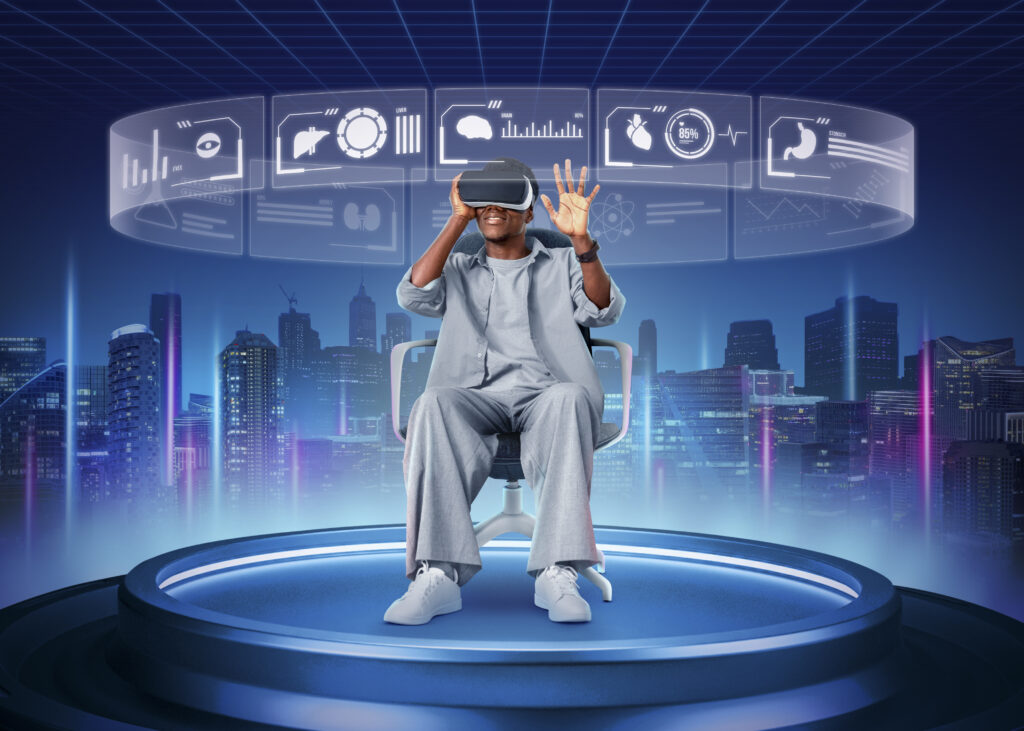As a new year has officially started, is it really necessary to comprehend what the Future of Digital Marketing 2025 holds?
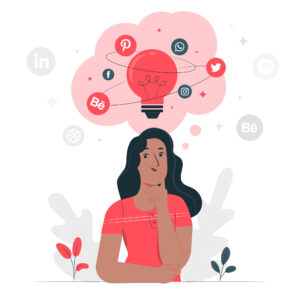
Staying ahead of the curve is crucial since, in actuality, the marketing sector is changing more quickly than digital marketing trends.
Digital Marketing future 2025 is about to undergo an important shift in the future of digital marketing. Digital marketing trends such as innovative, immersive experiences are substituting traditional methods, necessitating an extensive rethink of your strategy. One thing is sure regardless all the new trends: hyper-personalization is going to become the norm and mass media is drooping.
Where are we heading, next?
Let’s began by analysing what is currently taking on.
Consumers nowadays have high expectations; they want meaningful interactions with businesses that relate to them personally and provide genuineness and common values. Adopting digital marketing trends that place an emphasis on sincere interactions and transparency will be necessary to achieve these expectations in the future of digital marketing. However, consumers have become more cynical due to the constant onslaught of marketing messages on their gadgets, underscoring the necessity of tactics that establish credibility and encourage enduring commitment.
In this context, traditional interruptive advertising tactics like billboards and TV ads are becoming less effective.
Given the changing odds and challenges, what changes can we anticipate in the near future of digital marketing trends ?
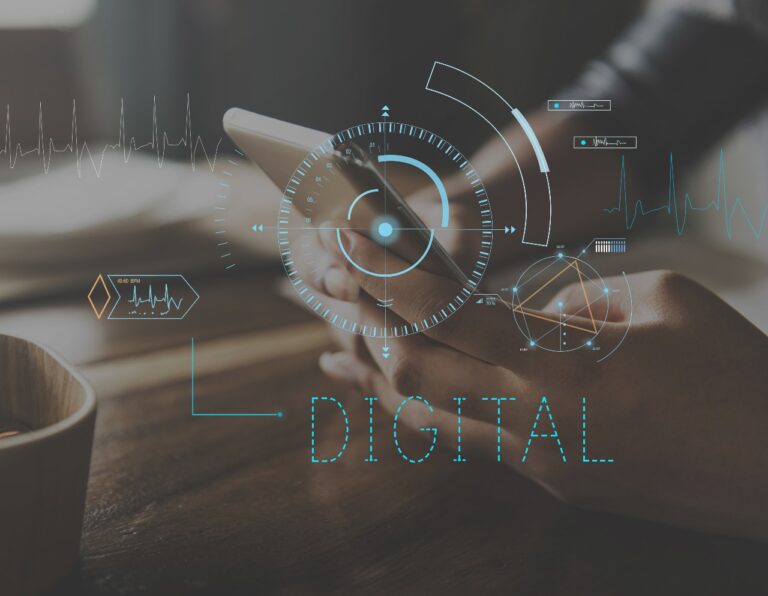
Where Will Digital Marketing Evolve in the Future of Digital Marketing ?
What tomorrow holds for digital marketing trends
Although there are plenty of possibilities for digital marketing future, let’s strive to project it utilising the rapid developments with technology and shifts in consumer behaviour.
For instance, data-driven, automated, and AI-optimized methods have grown more and more popular. Hyper-personalized suggestions, psychologically sophisticated chatbot companies to communicate and hyper-targeted social media advertisements. Delivering the right message on the right medium at the right time is the ultimate objective of these tactics.
1.A History of Digital Marketing’s Origins
Since the inception of the worldwide web, digital marketing trends has evolved rapidly. Simple marketing via email attempts and banners advertisements indicated the start of the journey in the early 1990s. The internet initially was mostly utilised for sharing knowledge, but as businesses recognised the possibility to reach an international audience, their methods for advertising began to shift. A new era of online visibility was ushering with the arrival of search engines like Google in the early 2000s, that enabled companies to use SEO (Search Engine Optimisation) to optimise their content for search.
Strategies for digital marketing trends evolved farther as social media platforms developed popularity in the second half of the 2000s. Facebook, Twitter, and LinkedIn changed consumer-brand communication by promoting more conversational and collaborative approaches. Then, as smartphones grew more prevalent, mobile advertising—which used apps and mobile-friendly websites—expanded marketing potential clients even further.
Significant Turning Points and Innovations
Optimisation of information to rank higher on search engine results pages (SERPs) is known as search engine optimisation, or SEO. This changed how companies handled user engagement and content creation.
Social Media Marketing (SMM): Through collaborations with celebrities and targeted advertising, platforms that include Facebook, Instagram, and afterwards TikTok gave businesses new methods to interact directly with customers.
AI: By the 2020s, AI tools like chatbots and predictive analytics had begun to alter how organisations engaged with their customers. Perfectly customised has been rendered accessible via technology for automation.
Video Marketing: Short-form footage, which has been growing significantly in the past few years, has grown into an important medium for businesses due to sites like YouTube and TikTok.
By 2025, artificial intelligence (AI), machine learning, augmented reality (AR), and 5G technologies will have further advanced digital marketing trends .
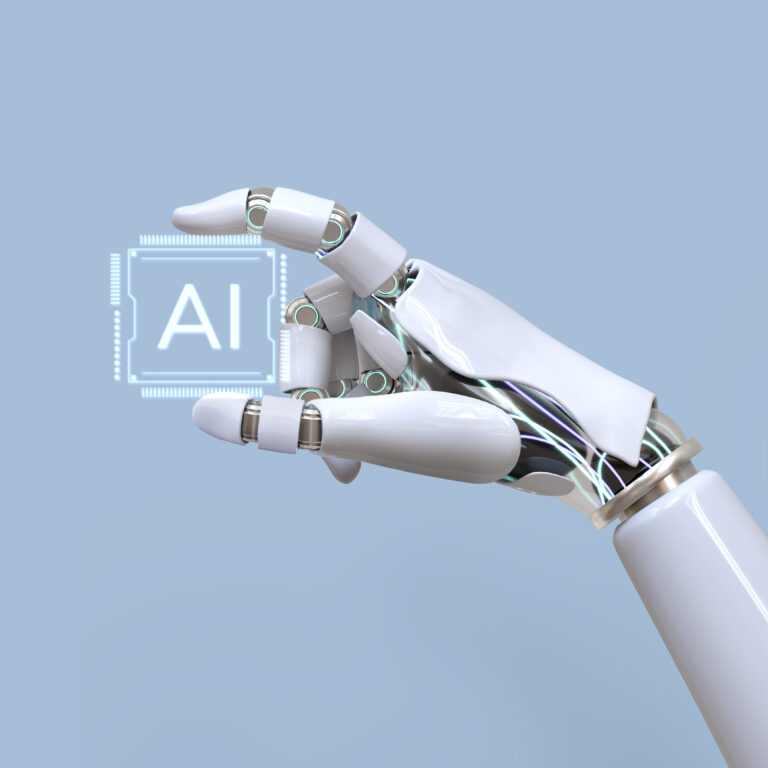
2.Artificial Intelligence’s Role in Digital Marketing Trends
Artificial Intelligence and Automation in service to customers
Digital marketing trends has been greatly influenced by machine learning (AI), and this trend is only expected to continue to expand in the years preceding 2025. Activities like client segmentation, ad targeting, and email marketing can now be handled with artificial intelligence (AI) tools, significantly boosting efficiency and uniqueness.
AI will be significantly more integrated into advertising campaigns in 2025, particularly when it relates to consumer engagement. Machine learning-powered chatbots and AI assistants will manage real-time consumer interactions on websites, social media, and smartphones and tablets. They can resolve issues, make hyper-personalized suggestions, and even execute operations.
As a case study, an organisation with the name Sephora implements AI-powered technologies to offer consumers on the web with customised product recommendations. By 2025, artificial intelligence (AI) will possess a stronger understanding of consumer preferences and be able to provide tailored, real-time recommendations based on surfing patterns, past purchases, and outside information like location or weather.
3.Hpyer-Personalization
Hyper-Personalization: Personalizing Unique Experiences
In 2025, hyper-personalization will become the new standard as collecting data gets increasingly improved. The hyper-personalization is more than just greeting an individual by name or recommending items based on their past behaviour. It entails altering the consumer’s entire digital experience by utilising data from various places to generate unique interactions.
For example, considering the user’s location, their surfing preferences, and even the moment of day, a website could alter its design, language, and offers in along with providing tailored product suggestions. Artificial intelligence (AI) techniques will be utilised by marketers to deliver emails, content, including adverts that are tailored to the individual with a level of precision that seems completely unique.
Amazon, for illustration, already makes use of hyper-personalization through offering suggestions for products according to surfing trends, previous purchases, and even products that were previously left in the cart. Businesses that don’t invest in personalization run the risk of losing customers as this is going to become the standard throughout all industries by 2025.
Concerns about Data Privacy and Ethics
However, concerns about privacy of information continue to rise along with hyper-personalization. More strict regulations (like the GDPR in Europe) are expected to propagate globally by 2025. Marketers have to find a balance between client confidentiality and tailoring through offering clear opt-in or opt-out substitutes and being truthful and open regarding collecting information and utilisation.
Additionally, brands need to implement responsible data procedures that make sure companies handle client information sensibly. This will encourage confidence, something that’s essential in a time when security is a major worry.
AI-enabled statistical analysis, that allows firms to forecast how customers behave via past information, will additionally promote information-driven decision making. This will be especially useful for creating content and creating targeted advertising strategies. By analysing trends, machine learning algorithms will be able determine the most effective strategy of action towards interacting customers, boosting conversion rates and improving the return on investment overall.
4. Media Marketing’s Destiny
Interactive and filmed material
Though content advertising continues to dominate the future digital marketing 2025 , it is going to involve more complex and engaging formats. Because live broadcasting and short video clips have been demonstrated to boost participation, video content is going to continue to be an effective tool for interaction.
Games, enquiries, and questionnaires are examples of interactive content that will become more and more crucial for brands trying to connect with consumers on a deeper level. Customers are expecting more interaction with brands, including hyper-personalized video interactions and simulated samples of goods.
Nike, for instance, has been using fully immersive and dynamic footage to let consumers examine their items. Brands will be able to offer even hyper-personalized and engaging interactive content by 2025, such virtual demonstrations of goods or 360-degree motion pictures.
Conversational Advertising with Voice Search
Organisations must adapt their approaches to content to include speech-optimized content when voice search grows increasingly common on cellphones and intelligent speakers. This involves creating blogs, FAQ pages, and product descriptions in an informal style. Optimising for voice search will be a top goal since it will make up a sizable percentage of every query searched by 2025.
For instance, someone using a virtual assistant when looking for “best running shoes” is going to prefer succinct, spoken answers that offer relevant options right away. In order to ensure they appear at the top of search results, businesses will need to tailor their web pages for these types of queries
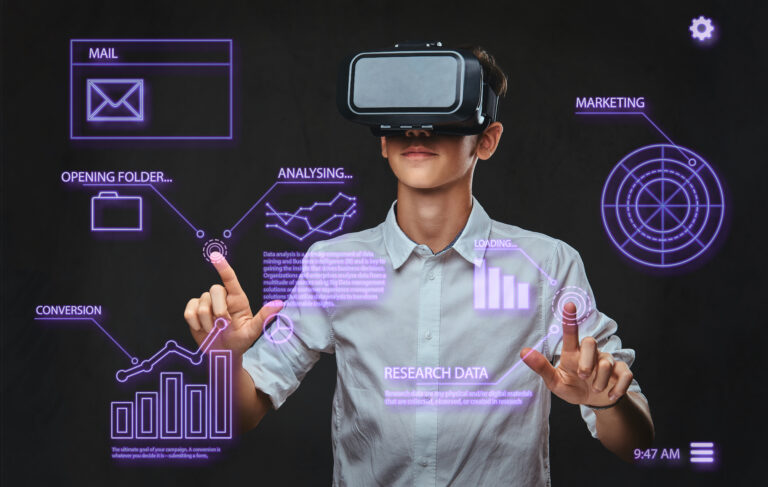
5.The Creation of Immersion Events in Digital Marketing Trends via Augmented Reality (AR) and Virtual Reality (VR)
AR and VR are going to become more broadly accessible and helpful in advertising campaigns as 5G wireless technology advances. By 2025, we predict that these technologies will generate dynamic, highly engaging customer experiences that let buyers see items before they buy things.
Customers will be enabled to use their smartphones or AR glasses to interact with things in their immediate surroundings thanks to augmented reality (AR). Customers might be able to digitally “try on” clothing or see how equipment will fit in their home before making a purchase, for instance.
For instance, IKEA’s IKEA Place application uses virtual reality to let consumers see how furniture would look in their current residences. By 2025, this sort of experience will be widespread, especially in sectors like tourism, real estate, and retail.
How Brands Will Interact Through AR and VR
VR will be utilised in digital marketing trends to offer consumers more realistic brand encounters in alongside commerce. Customers might be able to virtually explore homes, vacation destinations, or even live shows from the warmth of their own homes thanks to virtual reality (VR).
For instance, the company owned by Walt Disney is currently promoting theme park experience via the use of virtual reality. With the help of this technology, businesses may eventually be able to build whole virtual worlds where consumers may engage with merchandise, take part in live events, or attend virtual store openings.
6. Social Media: A Changing Environment
2025’s Upcoming Social Media Trends
Social media will be substantially decentralised by 2025, and new platforms that emphasise control by users, privacy, and protection might appear. An essential component of social media marketing might be the metaverse, which is a virtual community formed by the combination of the web and digitally augmented physical reality.
In addition, platforms like YouTube, Instagram, and TikTok will continue to lead the way for broadcasting live and short-form footage usage. As online communication platforms evolve into retail outlets for goods and services, social commerce will likewise change.
What’s Next for Influencer Marketing?
Having more emphasis on micro and nano influencers—people with smaller but highly engaged fan bases—influencer marketing is going to evolve. Large, celebrity-style ambassadors will provide way to more authentic voices that are appealing to specific groups in ambassador relationships by 2025.
For example, brands are increasingly working together with Instagram micro-influencers or TikTok producers who may increase interaction and generate specific traffic, especially in specialised markets. With their devoted fan bases, these influencers will enable marketers to build deeper connections with customers.
7.Sustainability’s Growing Importance in Digital Marketing
Sustainable Projects and Green Marketing
Biodiversity will be the hallmark of successful digital marketing future 2025. Environmentally aware solutions have already grown increasingly popular worldwide, and the trend is only going to pick up speed in the decades to come. Consumers are going to hold brands accountable for how they affect the environment as ecological problems gain urgency. When it comes to efficiently and truthfully communicating a brand’s environmental initiatives, digital marketing will be crucial.
Eco-Friendly things and Communication:
Organisations that promote ecologically conscious items are going to emphasise their sustainable characteristics on their websites and mobile devices. This might include marketing cost-effective goods, making use of recycled resources, or promoting initiatives like garbage reduction or zero emissions. Marketers will explain the product’s sustainability journey using a range of media forms, such as blog posts, infographics, and videos.
For instance, brands such as Puma and Allbirds have long prioritised sustainability in their branding. This is going to be an essential component of future of digital marketing 2025 for a growing variety of organisations in every sector, including IT, food, and fashion. Puma already uses social networks to spread information regarding its dedication to minimising its impact on the natural world and even encourages consumers to purchase vintage products so as to cut out waste.
Sustainable Certifications and Disclosure:
Consumers are looking for confirmation that organisations aren’t solely false advertising but truly responsible. Transparent reporting that shows eco-labels, third-party certifications, or data regarding the ecological effects of items must encourage digital marketing trends. Expect increased demand for willingness about how organisations fulfil their green claims, as well as a greater focus on verified environmentally friendly procedures in digital ads.
Sustainability and Consumer Behaviours:
For businesses to attract eco-conscious sectors, organisations have to use customised digital marketing trends as consumers are seeking alternatives that are more sustainable. Digital marketing platforms are going to employ AI-powered analysis of data by 2025 to reach consumers with sustainable messaging and split them into groups according to goals related to sustainability. As an essential part of the client experience, brands will also need to inform consumers about the environmental advantages of their goods and services.
8. 5G’s Influence on Future of Digital Marketing: More rapid softer User Experiences
With greater bandwidth, lower latency, as well as more reliable interactions, the introduction of 5G networks will transform future of digital marketing. The capacity to provide fluid, excellent, and engaging information will be commonplace by 2025. With the enhanced abilities of 5G, digital marketers will be able deliver more dynamic and appealing material without being concerned over lengthy loading times or issues with connectivity.

For instance, 4K resolution footage, HD broadcasting, as well as 360-degree panoramic video encounters may soon become mainstream. These instruments will be used by advertisers to offer higher-quality and personalised brand experiences. For instance, a retailer may offer online testing sessions that let buyers see how an item appear in real time, or an automobile business could organise virtual car exhibitions and let users explore different kinds of cars in 360 degrees.
The way that video content appears will also shift significantly using 5G connections in future digital marketing. Additionally, there is going to a rise in the use of actual time video marketing, such broadcasting things, new product launches, and behind-the-scenes company visits. immediate delivery of material will minimise buffering and lengthy loading times, giving users a more seamless browsing experience.
Better Mobile Experiences:
By 2025, mobile phones will be responsible for an important portion of digital marketing trends, and 5G will further simplify smartphone interactions. The entire user experience is going to be improved by smooth transmission of AR experiences, high-quality video, and faster loading times. This will be particularly beneficial for businesses where involvement requires immediate, high-quality material, such as retail, entertainment, and gaming.
9. Voice Search and Conversational AI
2025 Voice Search Optimisation
By 2025, boosting for voice searches will be an essential part of SEO due to the increasing popularity of AI assistants such as Apple Siri, Google Assistant, and Amazon Alexa. Businesses must adapt their approach to content to take into account this novel way of interacting with engines like Google as voice search questions tend to be lengthier as well as more chatty than written queries for searches.
Natural Language Processing (NLP):
As voice searching grows more widespread, search engines including Google will continue to improve their understanding of conversations by using NLP. Because of this, advertising agencies must rethink their keyword strategies. Rather than focussing just on short-tail keywords, marketers will have to optimise on long-tail keywords and employ phrasing that is similar to human speech. For instance, a voice query for “what are the best running shoes for flat feet” would get results rather than “running shoes.”
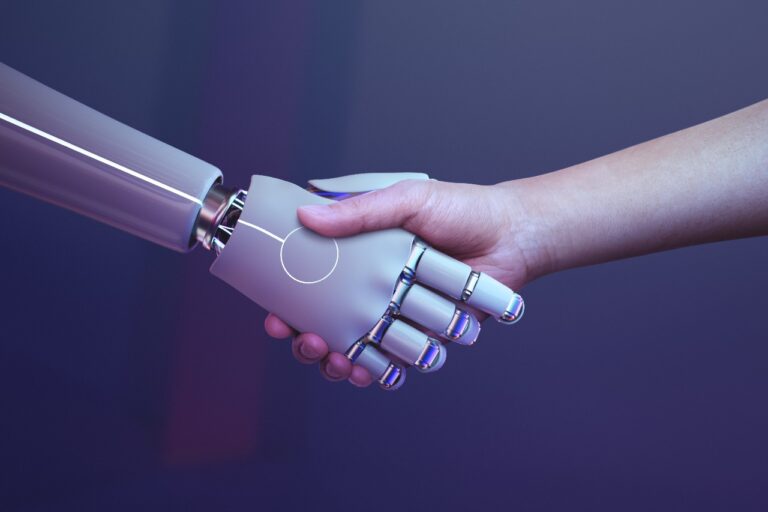
For instance, if someone asks their voice assistant, “What are the best vegan protein powders?” they could anticipate a straightforward response. For businesses to score well in voice search outcomes, they must concentrate on producing information that responds enquiries intelligibly and conversationally
Chatbot Companines and Conversational AI:
In addition to voice-based searches, AI that speaks will develop further, enabling companies to interact with customers more individualised, human-like ways. Chatbot companies and virtual assistants generated by AI will be used by organisations more and more for generating leads or support for customers by 2025. Brands will soon be able to communicate with consumers in actual time thanks to those technologies’ effortless integration into websites, apps, and social media platforms.
For instance, chatbot companies are already being used by businesses such as Sephora to help clients to locate cosmetics according to their individual interests. These chatbots will be far more advanced by 2025, offering tailored product suggestions, responding to complicated questions, and assisting clients with the purchasing process with little assistance from humans.
10. SEO and SEM’s Future
Modern SEO Methods and AI-Powered Google Engines
By 2025, machine learning as well as AI will play a major role in the ongoing evolution of the Search Engine Optimisation (SEO) environment. Businesses must optimise their written material for search queries as Google’s algorithm changes, such as the BERT algorithm update, that assist Seo identify the purpose behind search requests, becoming increasingly complicated.
In 2025, SEO will involve more than just rating for particular keywords; it will additionally include comprehending the purpose of searches. This entails producing material that attracts users, offers thorough information, and responds to certain queries. In order to appear highly in search engines, organisations must prioritise the user experience, speed of pages, and written quality as well as to more conventional SEO elements like backlinks and keyword optimisation.
Speech Search and Featured Snippets:
The popularity of prominent snippets and initial ranks, which are frequently the consequence of conversation or question-based queries, will additionally have to be taken into consideration by SEO. In order to properly address frequently asked topics in succinct, organised formats, marketers will need to organise their material.
For instance, information might require to be organised to address specific queries such as “What’s the most effective way to prepare a steak medium to rare?” rather than simply writing an article titled “How to Cook a Steak.” for “For how long do you cook a steak each and every side?” This will make it more likely to show up in snippets with features and results for voice searches.
Advertising on social networks & Sponsored Search
As technology and artificial intelligence become more integrated, search engine marketing, or SEM, is going to change. AI is going to be used by Google and social media sites like Facebook and Instagram to optimise bids, ad targeting, and even the development of advertising copy in the moment. By automatically compensating for variables including setting, the hour of the day, and behaviour of users, AI will help businesses develop more effective sponsored searches.
By 2025, social networking organisations will provide improved targeting according to demographics, hobbies, and behaviour, further refining advertising on social media. AI-powered technologies will be used by marketers to produce dynamic, customised advertisements that are optimised for different platforms and feature bidding in real time.

11. The Function of Data Security and Privacy
Security of data and trust among customers
By 2025, privacy and security of data problems will continue to be a major worry as digital marketing trends grows increasingly information-driven. Concerns over the collection, storage, and use of customer data have been sparked by more complex data collecting and monitoring technologies, such as cookies, browser fingerprinting, and tracking pixels.
Brands’ handling of private information is going to be influenced by laws like the California Consumer Privacy Act, or CCPA, and the Global Data Protection Regulation (GDPR). Such data privacy laws will probably be introduced in other nations by 2025, therefore companies have to take proactive measures to ensure compliance.
For instance, major digital firms like Apple and Google have already included tools that let users choose not have their data tracked. Digital marketers are going to remain truthful and forthcoming about how they gather data as these instruments and rules proliferate. Customers will anticipate that brands are going to be transparent regarding the types of information they gather, how they utilise it, and what advantages they’ll get in exchange.
Good data security procedures & openness about how data is used will put organisations in a stronger position to win over customers. However, neglecting to do so may result in legal repercussions, a loss of consumer loyalty, and harm to one’s reputation.
12. Conclusion
Getting Ready for the future of digital marketing
In conclusion, technical innovations like voice search, 5G, AR/VR, and machine learning will have a significant impact on digital marketing in 2025. To be profitable, digital marketing trends must accept these developments and maintain their agility. A firm dedication to sustainable and information confidentiality, decision-making based on data, and lhyper-personalization will be essential components of success.
Most important for companies hoping to prosper in this changing environment will be making investments in innovative technologies, data-driven marketing plans, and genuine customer connections. Staying ahead of these digital marketing trends and adjusting to shifting consumer demands will put firms in a better position to develop more significant and successful marketing efforts in the years to come.
FAQs
Anticipate developments such as AI-powered advertising, voice and visual search optimisation, campaigns using both virtual and augmented reality, a greater emphasis on environmental messaging, and highly customised consumer experiences.
AI will be important in enabling chatbots, dynamic content customisation, statistical analysis, and effective ad targeting, which will render ads more intelligent and effective.
Optimising for voice searches and content that speaks is going to be essential for increasing being found and satisfaction with content as intelligent devices become more prevalent.
Businesses will be forced by stricter data privacy rules to prioritise first-party information, implement responsible data procedures, and foster trust via openness.
As social media sites like Facebook, Instagram, and LinkedIn keep growing, new platforms and specialised groups can gain prominence, necessitating a shift in marketing tactics.
In order to improve consumer engagement, brands will be able to provide dynamic and captivating experiences with AR and VR, such as virtual product try-ons, immersive storytelling, and virtual events.

